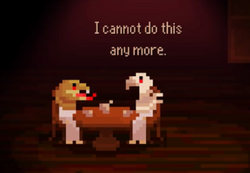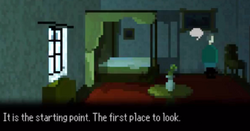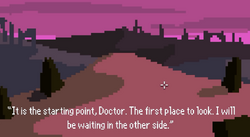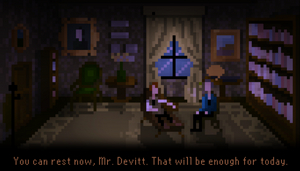Back to Fanon
This is an alternate ending to Beyond the Curtain. It's not canon, but it was approved by The Game Kitchen. The playable version is here.
Rationale[]
I’ve read that some people were disappointed with the ending for Beyond the Curtain that occurs if Wakefield goes through the curtain. The story had built up a lot of anticipation about the Last Door and the Other World. It was a little discouraging that those parts were skipped over.
I also thought that some of the characters’ motivations were a little unclear. For example, why would Wakefield offer to sacrifice himself? Why would Devitt let him? Why would the curtain start to close just as Alexandre finished talking? Why didn’t Alexandre try to stop Devitt himself? If Devitt was planning on sealing off Zha'ilathal, why would he lead Wakefield there instead of telling Wakefield to go home? There might be excellent answers to these questions, but the current ending leaves a fair bit for the players to work out.
With that in mind, I wrote a fundamentally different version of the ending. The contents are identical to the original English version except for the text. The new ending has been written to fit the images that appear at the end of the chapter, but it puts those images in a new context. Hopefully it’s true to the characters, pays off a few plot points, and is suited to a text-only format.
Spoilers
New ending[]
This ending occurs if Wakefield passes through the curtain.
At last, it was finished. I had succeeded. But once I heard the hideous, pain-filled screams, I lost my courage. I fled to London, where I had not set foot in nearly seven years.
Trembling with fear and exhaustion, I made my way to the safe house on Paul Street. It was here that the doctor had taken my eyeless mask. It was here that he had first drawn my gaze from within the Veil. | |
I hastily gathered up the notes in the house, kindled a fire and placed them on the crackling flames. As I watched them burn, I recalled how I had used the mirrors of Zha’ilathal to follow Wakefield's movements.
Captain Skidd tried to warn him about the shadows of the Veil, but the reek of the opium den had addled the doctor’s wits. My old friend Miss Konhe had seen me, as had Professor Wright. I did not mean to harm them, but perhaps their passing was for the best. Shortly after the Professor’s death, Wakefield eluded my sight. I began to hope that he had abandoned his investigation. | |
To my horror, he appeared in Zha’ilathal, with Devitt as his guide. Jeremiah has a generous spirit, but we cannot allow outsiders to influence our work.
When Devitt crossed the Threshold, he left behind a small memory. I wrapped the memory in shadow and cast it upon the curtain. In his haste, Wakefield must have mistaken the shadow for Devitt. He tried to pursue it into the Other World, a place where shadows are forbidden. He remained with the shadow until at last his madness took inhuman form. | |
Jeremiah will never forgive me when he learns of his doctor’s fate. But in time, he will come to be grateful for what we accomplish together.
It falls to me now to destroy the remaining evidence of our activities. |
Explanation[]
Hopefully the new content stands on its own. But since I'm not a writer for The Game Kitchen, I thought I'd explain where I'm coming from.
The narrator is Alexandre, who also narrated the cold open.
The new ending assumes that most of the things that Alexandre said to Wakefield were true. However, Devitt did not oppose the Playwright and he was not trying to close the Last Door. For example, this statement by Alexandre was a deliberate lie:
| “ | [Devitt] told me that he was going to put an end to all of this. Once he learns the Final Truth, none of this will ever have existed: the Order, the Door, or ourselves! You must stop him, Doctor. You must stop him before the Curtain closes forever! | ” |
— Alexandre
|

The mask at Paul Street (Chapter 5)
When I first played the episode, I thought this sounded like a trick. It sounded like Alexandre was trying to win Wakefield’s trust by giving him lots of information. He then tried to pressure Wakefield into making an important decision without giving him time to think. The new ending explores what Alexandre might have been trying to accomplish.

Miss Konhe sees the mask (Chapter 5)
In Chapter 5 (The Playwright), Wakefield broke into Alexandre’s house on Paul Street. He found an eyeless mask mounted on top of a robe. When he took the mask, I had the impression that something important had happened. The new ending implies that Alexandre had a sort of link with the mask. When Wakefield took it, Alexandre became aware of him. He was concerned that Wakefield might expose the Playwright, so he started following the doctor. (Once he saw Wakefield, he no longer needed the mask to follow him.)
When Wakefield showed the mask to Miss Konhe, she sensed that Alexandre was watching them. That’s why she had such an extreme reaction and why she said, “It is eyeless but not blind.” When Wakefield and Kaufmann approached her hideout, she said, “They are coming. They are letting him in.” She meant that Alexandre was following Kaufmann and Wakefield. I don’t know why she would be afraid of Alexandre, or why she apparently turned into a flock of birds. Alexandre and Konhe seem to have some history together, so maybe there’s something between them that we don’t know about. Maybe Alexandre didn’t mean her any harm, but Konhe nevertheless found his gaze from within the Veil to be unbearable. (Anna Beechworth might have been in a similar situation in Chapter 1 when she wrote, "I can't stand their stares.")

Captain Skidd (Chapter 5)
Alexandre also observed Wakefield talking with Captain Skidd, though Skidd was not aware of his presence. Skidd warned Wakefield that Alexandre and the Playwright were dangerous. The new ending implies that Skidd also warned Wakefield about the dangers of peering into his own truth. When delivering the warning, Skidd used the metaphor of “the snake and the bird.” This metaphor also appeared on a sign in Zha’ilathal:

The snake and the bird (Chapter 5)
| “ | Peering into one's own truth is forbidden. Were the snake and the bird to meet, ultimate madness would take inhuman form. |
” |
— The "mirror sign" in Chapter 8
|
By the time that Skidd started talking about snakes and birds, Wakefield had breathed in quite a bit of opium smoke. Instead of hearing Skidd’s words, he had a hallucination of a play in which a snake and a bird had a forbidden romance.

Mysterious voice (Chapter 5)

Devitt and Wakefield (Chapter 8)
I think that Wakefield’s vision of Devitt was real, though perhaps it was also facilitated by opium smoke. I think it was a premonition of their reunion in the Veil. It is not mentioned in the new ending because Alexandre doesn’t know about it (it happened entirely in Wakefield’s mind).
Alexandre followed Wakefield to Wickport, but he was unable to look inside of Wright Manor. When the Professor’s birds sang, it had the effect of blocking out intruders from the Veil. (Wright was worried about visitors from the Veil, but he wasn’t necessarily expecting Alexandre.) Alexandre knew that Kaufmann and Wright could learn a great deal from the Professor’s records, so he tried very hard to see what was happening inside the house. When the birds fell silent, Alexandre’s efforts suddenly succeeded. In fact, he put so much effort into entering the house that his reality got mixed up with the house. He found himself physically standing in front of Wright, who died of shock.
I don’t know if Alexandre followed Wakefield down into the caverns below Wickport. It might not matter if he had.

Alexandre was not involved in Kaufmann’s death. As he told Wakefield, “Sometimes terrible fates befall the companions of Travelers.” Alexandre is aware that companions sometimes die mysteriously. He’d like to keep those deaths to a minimum, since they could expose the Playwright. He's also genuinely sorry to see people die.
When Wakefield became depressed, it became harder for Alexandre to track him. When Wakefield went to Éilís Mór, Alexandre lost him completely. The mystical energy on Éilís Mór is very powerful and beyond Alexandre’s comprehension (at least for now). It defeated him so completely that he didn’t realize anything was happening. He thought that Wakefield had given up on the investigation.
When Alexandre saw Wakefield in Zha’ilathal, he panicked. He respects Wakefield as a person, but he thinks of Wakefield as being an outsider. Alexandre was afraid that Wakefield might tamper with the Playwright’s experiments, or even trigger some accident that could get people killed. He decided that he had to remove Wakefield, but he knew Devitt would oppose him. So he waited until Wakefield was alone.
What Alexandre did next depends on Zha’ilathal really is. Zha’ilathal contains many shadow memories. The people in those memories act as though they were real. Maybe they even believe themselves to be real. In my opinion, these shadow memories are a clue about the true nature of the Last Door. Perhaps our entire world is a shadow memory that is located in someone else’s Zha’ilathal. In that case, we are essentially shadows that were dreamt up by some unimaginable being. The Playwright considers our lives to be performances because we are simply acting out a memory. To pass through the Last Door is not to enter a shadow, but to step out of one.

The sign over the sewer (Chapter 3)
If that’s true, then it’s hard to say what happens when a person passes through the Last Door. Is it possible for a memory to step out of the shadows and enter the same world as the creature that remembered it? Maybe that sort of thing is possible in the Veils between worlds. Or maybe the memory would simply gain a better understanding of its true position in the cosmos. It would realize that each truth is the shadow of another truth, and each shadow casts shadows of its own. In Chapter 3, there was a sign that included the phrase, “I am a shadow’s shadow.” If everyone in our world is a shadow, then the memories in Zha’ilathal would be the shadows of shadows.

Devitt crosses the threshold (Chapter 8)
Alexandre might know more about Zha’ilathal and the Veil than anyone currently alive. When Devitt crossed the threshold at the beginning of the chapter, Alexandre was watching him. In the new ending, Alexandre noticed that Devitt had left behind a memory. He turned that memory into a shadow that Wakefield would encounter as he passed through the curtain. Somehow, he made the memory into a trap for Wakefield.
Having said that, I’m not sure what the trap would have been. Chapter 8 emphasized the dangers of peering into your own shadow. Maybe Wakefield saw himself in a memory and it caused him to transform. Another possibility is that Wakefield peered into a shadow at the same time that he was leaving the Veil. As a result, he saw the real Devitt and a shadow Devitt at the same time. For an experienced member of the Playwright, the contradiction wouldn’t be a problem. But for Wakefield, it was more than he could handle. I’m not totally happy with either of these explanations. But I think it’s highly plausible that Alexandre would have tried to stop Wakefield in some manner.
After Wakefield’s demise, Alexandre fled to London, where he started destroying the remaining evidence of the Playwright’s activities. It’s unclear whether he also intends to murder potential witnesses. As for Devitt, he never actually tried to close the Last Door or undo the work of the Playwright. That was Alexandre’s lie. He is in the Other World, waiting patiently for Wakefield to join him. If he encounters a "transformed" Wakefield, Devitt will be very upset, but he will most likely survive the encounter.
Potential strengths[]
As I see it, these are the strengths of the new ending.
Peril
Wakefield received numerous warnings that Alexandre and the Playwright were dangerous. Chapter 8 included several warnings about the dangers of peering into the shadows of Zha’ilathal. The new ending pays off those warnings.
Dramatic stakes
In the official version of the game, no matter which choice you make, one protagonist will live and the other one will die. If the "Devitt ending" is replaced with the "Alexandre ending," the player’s choice makes more of a difference. Wakefield will either die horribly, or he will slink home, ashamed of his cowardice, and never realize how much danger he was in.
The world beyond the curtain
It was disappointing to not see the Other World. But even if we had seen it, there was so much anticipation that anything The Game Kitchen could have shown us might have been disappointing anyway. The new ending shifts the focus away from the Other World and puts it on the Playwright. To me, this makes sense, because Season 2 is more about the Playwright than the Other World.
A complex villain
As TV critic David Hines once said, a complex villain acts in a way that is “monstrous, human, believable, understandable, even horribly sympathetic, and wrong.” I tried to portray Alexandre as being dangerous, but not completely evil. He was willing to destroy Wakefield, but he hoped it wouldn’t come to that.
I also wanted Alexandre to be behind some of the mysteries of Season 2, but not all of them. If every strange event could be explained by “Alexandre did it,” then the story would be in danger of losing much of its mystery. Alexandre did not cause the strange events at the opium den, or at Éilís Mór. He was not responsible for Kaufmann's death. He probably didn't cause Miss Konhe to turn into a flock of birds.
Text-only format
The new ending is intended to be suitable to a text-only format. Instead of describing new scenes that the player doesn't get to see, it describes previous scenes, but from Alexandre’s perspective. The only new content is Wakefield’s transformation, which might be best left to the player’s imagination.
Potential weaknesses[]
Author’s intent
Obviously, The Game Kitchen did not create the new ending and does not necessarily endorse it. (Though they explicitly gave permission for it to be published.) Some people may prefer not to play fan-made content, especially if it recontextualizes the story.
The “Tomb of Horrors” problem
Advanced Dungeons and Dragons has an infamous module called Tomb of Horrors. At one point, the players come to a door. If they walk through it, they are destroyed. Many players found this trap to be frustrating and arbitrary. Similarly, some players might find it to be frustrating to have Wakefield get all the way to the Last Door, only to have it destroy him.
Alexandre’s abilities
There is some canonical evidence that Alexandre has been watching Wakefield from within the Veil. For example, he told Wakefield, "I knew you would reach us. He [Devitt] doubted Kaufmann would make it, but he knew you would." However, I don’t know of any evidence that Alexandre can manipulate shadow memories. To be fair, there’s also no evidence that he can’t do it. Still, by giving Alexandre an important new power, the new ending might seriously deviate from The Game Kitchen’s vision of Zha’ilathal and the Playwright.
Alexandre’s personality
We’ve seen that Alexandre is ruthless. But as far as I know, he never lied to anyone. In fact, Skidd even said, "If you think he tricked me you could not be more wrong." It might be a little out of character for Alexandre to try to trick Wakefield.
Also, between his monologue at the curtain and his monologue in London, Alexandre does a lot of talking. I tried to break it up by transitioning from a "public" conversation to a private monologue, but it still might be too much.
The trap
Like I said, I'm not totally happy with the nature of Alexandre's trap. It's a bit elaborate. I had a hard time coming up with something that would work as trap, but which Devitt wouldn't suspect. An earlier version was:

Devitt's hypnotism session (Chapter 2)
When Devitt crossed the Threshold, he left behind a small memory, that of a hypnotism session. I wrapped the memory in shadow and cast it upon the curtain. If Devitt were to see this memory, his madness would take inhuman form. And as I have now learned, the same is true of the hypnotist.
I think this version reads better than the other one. But there's no reason to believe that a person is forbidden from peering into other people's memories. Also, it's unclear in this version whether Wakefield actually made it to the other world.



